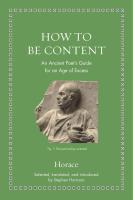
Princeton (2020) h/b 238pp £13.99 (ISBN 9780691182520)
This book is a delight. Drawing on Horace for the poet’s recurrent themes on how best to lead one’s life, H., professor of Latin literature at Oxford, does what so few seem willing or able to do today: he quotes and translates his sources and then luminously expounds them, drawing everything he has to say directly from the words on the page. Consequently, the reader knows exactly where H. and (s)he are at every stage of the operation. So simple: o si sic omnes.
There are four chapters. In ‘The Search for the Good Life’, H. finds Horace recommending that one remains contented with one’s lot in life, does not worry about the future, appreciates the moment (carpe diem) and does not seek wealth in excess. In ‘The Importance of Friendship’, Horace suggests harmonising personal and professional relationships, emphasises personal qualities over bank balance, and urges tolerance of foibles and the importance of support in times of trouble, and especially retirement. ‘Love—The Problem of Passion’ finds Horace admitting there is something to be said for a long-term relationship but, in its absence, make the most of the thrill of intense lust in the sure knowledge that it is always subject to destructive jealousy and will not last (he rather teases his chum the love-poet Tibullus on this score). ‘Death—The Final Frontier’ reworks much of the same material—make the most of life while you can, be grateful for what you have achieved whatever the future holds, remain mentally resolute and tranquil.
This bald summary reads like the cracker-barrel stuff churned out by ‘wellbeing’ consultants and ‘mindfulness’ experts @£150 an hour (scented candles extra). But with the whole of the classical tradition at the point of his stilus, Horace turns these basic but still compelling ideas into things of great resonance, beauty and power, humanely and elegantly elucidated by H. in each of his thirty-three extracts. This should be in the pocket of every lover of Latin literature, and especially of Horace.
One suggestion here for the publisher. The Latin of the chosen texts is followed by the translation, but since this is a pocket-sized volume, the reader who does not know the Latin well will be flicking forward and back to line up the one with the other. The problem is compounded by the absence of line numbers. It would be better to set text and translation side by side across the pages, which would also help the translator not to miss anything, as H. does at Epistles 1.10.25 and 31-2. (I also noted a misprint qucquid on p.17 and a mistranslation at Odes 4.9.45-6).
Peter Jones
